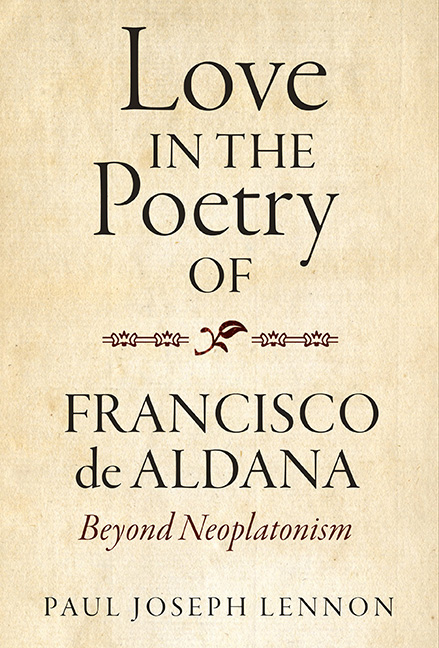4 - (De)mythologising Love
Published online by Cambridge University Press: 15 October 2019
Summary
In this final chapter we broach the subject of Aldana's use of the mythological genre in his poetic exploration of the nature of love. First, by way of orientation, I wish to consider the mythological tradition before moving on to analyse the love between two human characters in a fragment based on the story of Medoro and Angelica from Ariosto's Orlando furioso (1532), in which the character of Cupid plays an interesting and ambiguous role. The second part of this chapter is concerned with the effects of love, both positive and negative, on two divine figures: Mars and Venus. The deities emerge as protagonists in two distinct texts, one a sonnet and the other an incomplete fragment in octavas, which differ greatly in their ends. The three texts, which are grouped by the commonality of their mythological content, also offer a variety of perspectives on sensual love and its potential consequences. Through close textual analysis we will see how the complex, interwoven textual roots from both contemporary and classical sources permit Aldana to produce mythological texts that are less overtly moral than their contemporary Spanish counterparts. The resultant mix of sensuality, physicality and spirituality ultimately showcases the poet's view regarding the powerful and pervasive nature of love in the earthly realm and beyond.
The growth of the mythological as a medium for didactic poetry, as well as its broader cultural significance in the Renaissance more generally, is attributed by Bush to a continued fascination with the medieval tradition of moralising literature. From the twelfth century onwards biblical exegesis of mythological tales had proved a popular method for the continued inculcation of religious beliefs to help foster piety. The ability of myth to gain such a strong footing in Renaissance culture is attributable to its synthesis with the moralising tradition of the medieval era. The popular examples of the Ovide moralisé (c. 1317–28), Giovanni Bonsignori's Metamorfoseo volgare (1497), and their numerous reprints, best exemplify this process. These translations of mythological texts, sometimes in the loosest terms possible, were joined by mythographies, such as Giovanni Boccaccio's Genealogia deorum gentilium (1472), Vincenzo Cartari's Immagini degli dei degli antichi (1556), Natale Conti's Mythologiae (1567) and Pérez de Moya's Philosofía secreta (1585).
- Type
- Chapter
- Information
- Love in the Poetry of Francisco de AldanaBeyond Neoplatonism, pp. 125 - 166Publisher: Boydell & BrewerPrint publication year: 2019



